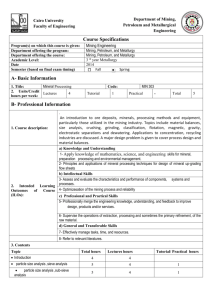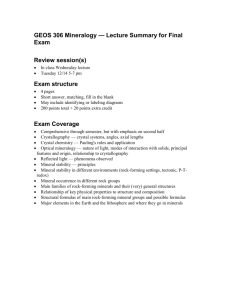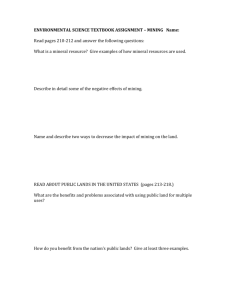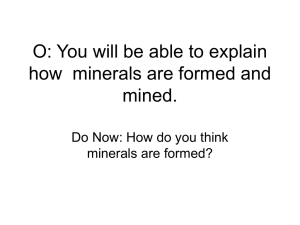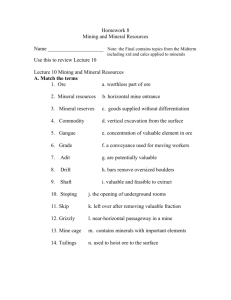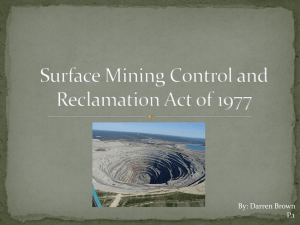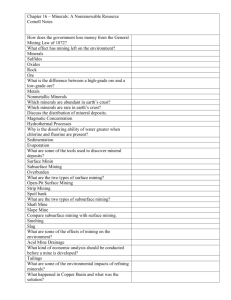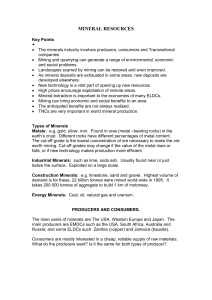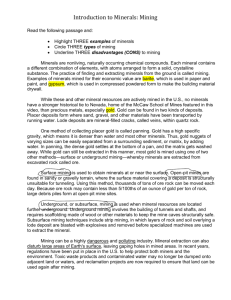Mineral Industries
advertisement
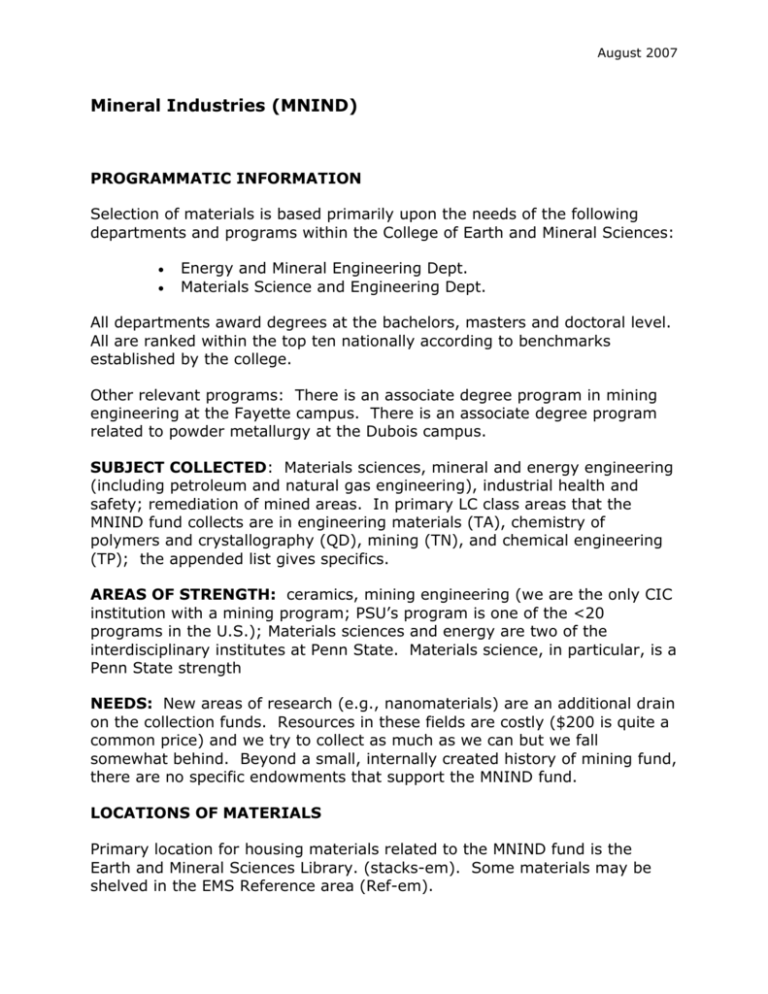
August 2007 Mineral Industries (MNIND) PROGRAMMATIC INFORMATION Selection of materials is based primarily upon the needs of the following departments and programs within the College of Earth and Mineral Sciences: Energy and Mineral Engineering Dept. Materials Science and Engineering Dept. All departments award degrees at the bachelors, masters and doctoral level. All are ranked within the top ten nationally according to benchmarks established by the college. Other relevant programs: There is an associate degree program in mining engineering at the Fayette campus. There is an associate degree program related to powder metallurgy at the Dubois campus. SUBJECT COLLECTED: Materials sciences, mineral and energy engineering (including petroleum and natural gas engineering), industrial health and safety; remediation of mined areas. In primary LC class areas that the MNIND fund collects are in engineering materials (TA), chemistry of polymers and crystallography (QD), mining (TN), and chemical engineering (TP); the appended list gives specifics. AREAS OF STRENGTH: ceramics, mining engineering (we are the only CIC institution with a mining program; PSU’s program is one of the <20 programs in the U.S.); Materials sciences and energy are two of the interdisciplinary institutes at Penn State. Materials science, in particular, is a Penn State strength NEEDS: New areas of research (e.g., nanomaterials) are an additional drain on the collection funds. Resources in these fields are costly ($200 is quite a common price) and we try to collect as much as we can but we fall somewhat behind. Beyond a small, internally created history of mining fund, there are no specific endowments that support the MNIND fund. LOCATIONS OF MATERIALS Primary location for housing materials related to the MNIND fund is the Earth and Mineral Sciences Library. (stacks-em). Some materials may be shelved in the EMS Reference area (Ref-em). August 2007 Areas of overlap with other funds and subject areas: Engineering: energy, geotechnical engineering (rock mechanics, tunneling, etc.); materials sciences (note: ENGIN will take primary responsibility for composites; MNIND will take primary responsibility for ceramics.); combustion; powder metallurgy; environmental remediation, particularly re groundwater, wetlands and land reclamation; industrial health and safety. EARTH sciences fund: minerals ; petroleum geology Physical sciences fund : polymers ; crystallography; nanotechnology. Life Sciences (AGBIO and Health) : microscopy techniques (at the atomic level); dental materials, biomaterials; industrial health/occupational hygiene Economics fund: economic aspects of minerals, environment, energy resources FORMATS COLLECTED; LANGUAGES; LEVEL; EXCLUSIONS Language: primarily English language Formats: no exclusions Educational level: popular and above Materials excluded: most lower division undergraduate textbooks; K-12 materials METHODS OF ACQUISITION: The major approval plans for this fund are Yankee Book Peddler (U.S.) and Lindsay & Croft (UK). There is a LC Cooperative Acquisition Program in place for SE Asia that supplies materials to this fund. August 2007 LC CLASSES COVERED AND CONSPECTUS LEVEL HC79.S8 Economic policy - Strategic minerals 4 HC103.7 Economic policy - Natural resources 4 HD95029624 Economic history and conditions - Energy Minerals and Metals 4 QD380-388 Chemistry – Polymers 4 QD901-999 Chemistry – Crystallography 3 QH201-278 Natural History – Microscopy 3 RA575578.W4 Public Health - Mine dust 4 S621.5 Agriculture - Land reclamation 4 T55-55.3 Engineering - Industrial safety 3 T174.7 Engineering materials – Nanotechnology TA450 Engineering materials - Nonmetallic materials 4 TA455.C43 Engineering materials - Ceramic materials 4 TA462 Engineering materials - Corrosion 4 TA706 Engineering - rock mechanics 4 TA740-748 Engineering - Rock excavation 4 TA712 Engineering - Underground construction 4 TC191-193 Hydraulic engineering - Submarine blasting 3 TD195.C58 Environmental effects of industries - Coal industry 4 TD195.M48 Environmental effects of industries - Mine subsidence 4 TD195.M5 Environmental effects of industries Mineral industry 4 TD195.P4 Environmental effects of industries Petroleum industry 4 TD195.Q3 Environmental effects of industries – Quarries 4 TD196.P4 Environmental effects of pollutants – Petroleum 4 August 2007 TN Mining engineering - Metallurgy 4 TP315-361, 365 Chemical technology – Fuel 3 TP785-889 Chemical technology - Clay industries, etc 4 TP10801148 Chemical technology - Polymers 4 TP11771180 Chemistry technology - Reinforced plastics 4 TP759 Chemical technology - Coal gasification 3 TP11501175 Chemical technology -Plastics 4 TP11831185 Chemical technology - Plastics, special forms 4 TS653-729 Manufactures - Electroplating 4 TS 925 Manufactures - Synthetic rubber 3 TS757-2301 Manufactures - Stonework, wood technology, etc. 3
